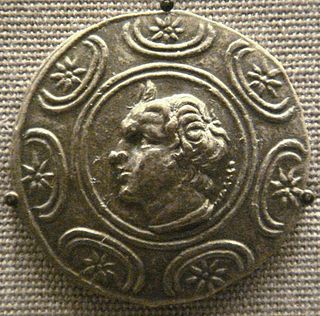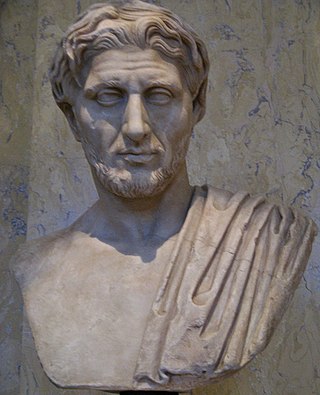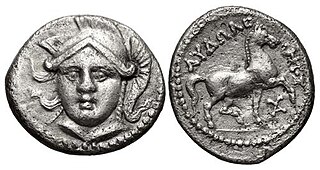This article concerns the period 319 BC – 310 BC.

This article concerns the period 309 BC – 300 BC.
This article concerns the period 289 BC – 280 BC.

Sicyon or Sikyōn was an ancient Greek city state situated in the northern Peloponnesus between Corinth and Achaea on the territory of the present-day regional unit of Corinthia. The ruins lie just west of the modern village of Sikyona. An ancient monarchy at the times of the Trojan War, the city was ruled by a number of tyrants during the Archaic and Classical period and became a democracy in the 3rd century BC. Sicyon was celebrated for its contributions to ancient Greek art, producing many famous painters and sculptors. In Hellenistic times it was also the home of Aratus of Sicyon, the leader of the Achaean League.
Philochorus of Athens, was a Greek historian and Atthidographer of the third century BC, and a member of a priestly family. He was a seer and interpreter of signs, and a man of considerable influence.

Demetrius I, called Poliorcetes, was a Macedonian Greek nobleman and military leader who became king of Macedon between 294–288 BC. A member of the Antigonid dynasty, he was the son of Antigonus I Monophthalmus and Stratonice and its first member to rule Macedonia in Hellenistic Greece.

Antigonus II Gonatas was a Macedonian Greek ruler who solidified the position of the Antigonid dynasty in Macedon after a long period defined by anarchy and chaos and acquired fame for his victory over the Gauls who had invaded the Balkans.

Demetrius of Phalerum was an Athenian orator originally from Phalerum, an ancient port of Athens. A student of Theophrastus, and perhaps of Aristotle, he was one of the first members of the Peripatetic school of philosophy. Demetrius had been a distinguished statesman who was appointed by Cassander, the King of Macedon, to govern Athens, where Demetrius ruled as sole ruler for ten years. During this time, he introduced important reforms of the legal system, while also maintaining pro-Cassander oligarchic rule.

The Lamian War, or the Hellenic War, was an unsuccessful attempt by Athens and a large coalition of Greek states to end the hegemony of Macedonia over Greece just after the death of Alexander the Great. It was the last time Athens played a significant role as an independent power.

Antigonus III Doson was king of Macedon from 229 BC to 221 BC. He was a member of the Antigonid dynasty.
Phila, daughter of Antipater, the regent of Macedonia, is celebrated by the ancient sources as one of the noblest and most virtuous women of the age in which she lived. Her abilities and judgment were so conspicuous even at an early age, that her father, Antipater, often consulted her in regard to political affairs.
Cratesipolis was the ruler of Sicyon and Corinth in 314-308 BC. She was the wife of Alexander and was highly distinguished for her beauty, talents, and energy. Her name may have been a nickname earned through her conquest of Sicyon.

Audoleon was king of the ancient kingdom of Paeonia from 315 until his death in 285 or 284 BC. He succeeded his father, Patraus, under unknown circumstances.
Deidamia was a Princess of Epirus.
The Battle of Amorgos was one of the naval battles of the Lamian War, fought between the Macedonian navy under Cleitus the White and the Athenian navy under Euetion. Although few details are known, it was a clear Athenian defeat, although the Athenians seem to have suffered few losses. Regarded as the decisive naval battle of the war, it signalled the end of Athenian thalassocracy and political independence.
Stratonice was a Greek noblewoman of very high status and was the wife of the Ptolemaic official Archagathus of Libya.
The Philaidae or Philaids were a powerful noble family of ancient Athens. They were conservative land owning aristocrats and many of them were very wealthy. The Philaidae produced two of the most famous generals in Athenian history: Miltiades the Younger and Cimon.
Alexander was a Macedonian governor and tyrant of Corinth. He was the son of Craterus who had faithfully governed Corinth and Chalcis for his half-brother Antigonus II Gonatas. His grandmother was Phila, the celebrated daughter of Antipater and first wife of Demetrius Poliorcetes. According to a note in Livy, his mother's name may have been Nicaea and this was also the name of his wife.
Lachares was a demagogue and tyrant of Athens at the turn from the 4th to the 3rd century BC.








